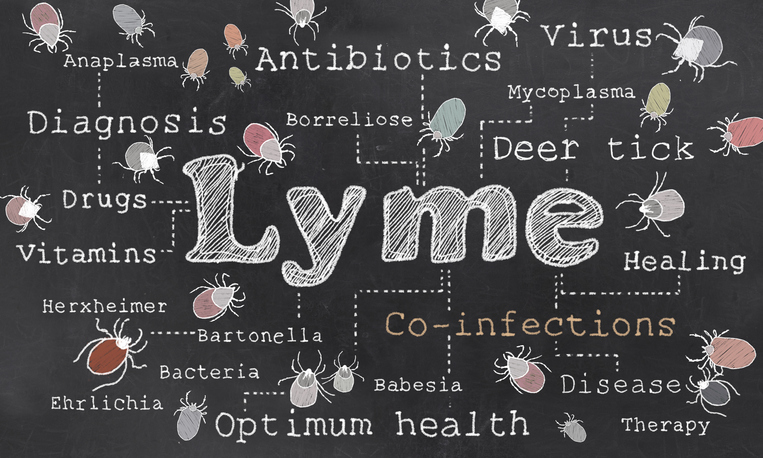Diagnosed With Alzheimer's, But It Was Really Tick-Borne Illness. Trust Your Gut, And Demand This Test

\By Joy Stephenson-Laws, J.D., Founder
When your spouse or partner is diagnosed with a disease, it may be more stressful and heartbreaking in more ways than one. The following story is an important one, because it is very informative and could save lives.
When Nicole Bell’s husband Russ started showing signs of severe cognitive decline, doctors believed it was Alzheimer’s. Nicole, however, suspected it was something else.
“Because Russ was very outdoorsy, and because I knew he had ticks on him over the years, Lyme disease was actually one of the first things that came to mind when I started looking into the symptoms of my husband’s cognitive decline,” Nicole said, in an essay for TODAY.
“The thing was, though, that Russ had never had a fever or a rash associated with ticks that we knew of, and when tested with the standard Lyme screener had come up negative.”

For further investigation, Ross had blood work done.
“It showed nothing out of the ordinary. Tick-borne illnesses, like Lyme, fell off my radar,” Nicole said.
The Centers for Disease Control and Prevention (CDC) reports that each year 30,000 cases of lyme disease are reported to them, however, there are many unreported cases due to people being misdiagnosed or not diagnosed at all. Lyme disease, which comes from a tick bite, may cause a multitude of uncomfortable symptoms such as fever, headache, fatigue and a skin rash. If left untreated, and it often does because the afflicted may not realize that they were bitten by a tick or confuse their symptoms for other conditions, lyme disease can spread to the joints, heart and nervous system.
Russ’s cognitive decline became so bad that he was unable to do simple arithmetic even though he was a computer scientist and electrical engineer, according to the essay published by TODAY. A neurologist said that he had a “stroke event” or Alzheimer’s, but an MRI revealed that he did not experience a stroke event. Furthermore, “A PET scan showed severe deficiencies in metabolism patterns, consistent with late-stage Alzheimer’s.”
To make this situation even more complex and puzzling, Russ was 60-years-old, which is young to have late-stage Alzheimer’s unless you have a “genetic component” (which Russ did not have). Nicole said she accepted the diagnosis after nine months until she spoke with her brother whose wife had been sick for years and was diagnosed with multiple tick-borne diseases.
This was motivation for Russ to get the test that would finally reveal the truth.“Russ was tested with a PCR test, the same way we now test for COVID-19, which looked for the organism itself rather than the antibodies. Russ had three tick-borne infections — the three Bs as they’re known — Borrelia (otherwise known as Lyme disease), Bartonella and Babesia,” according to the essay.
After a long battle and a lot of treatment, Russ, unfortunately, died in January of 2022. It appears it was just too late, and the disease just progressed. This is such a sad story and feels so unfair because of the misdiagnosis.
Doctors are not perfect and errors will occur, which is why I am so grateful Nicole shared her husband’s story. Now that it is summer, tick bites are common so it is especially important that we are proactive now. Check out these older pH Labs blogs to see what you can do to help protect yourself from ticks and what you can do if you get a tick bite.
If you or someone you know is experiencing symptoms and has not been diagnosed with anything or has cognitive decline but seems a bit young to have Alzhiemer’s, ask your doctor about the PCR test for tick-borne illness. It never hurts to ask for all of the tests that are out there and available to us. It could even save your life. The good news is that early diagnosis of lyme disease can usually be treated with antibiotics.
Follow your gut.
Nicole suspected Russ had lyme disease, and she was right. It’s just so difficult when you have a medical professional telling you otherwise, but it never hurts to ask for several opinions if you have to and request multiple tests.
Finally, never allow medical gaslighting to stand in your way. You have the right to take ownership of your health and ask as many questions as you want.
Enjoy your healthy life!
The pH professional health care team includes recognized experts from a variety of health care and related disciplines, including physicians, attorneys, nutritionists, nurses, and certified fitness instructors. This team also includes the members of the pH Medical Advisory Board, which constantly monitors all pH programs, products, and services. To learn more about the pH Medical Advisory Board, click here.







